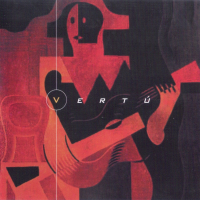Home » Jazz Articles » Album Review » Vertu: Vertu
Vertu: Vertu
If Stanley is the star, keyboardist Rachel Z is certainly the co-star. Her synth textures and chordal underpinnings give this music a lot of its character, and her acoustic piano is featured in abundance, which is one of the most welcome echoes of old RTF. Her confident solo on the mid up-tempo swing of "Topasio, Part Two" is one of the disc’s highlights. She also plays some propulsive single-note fills during "Toys," the album’s closer penned by Stanley Clarke.
However, these are only glimpses of her improvisational prowess, leaving this listener wishing for more extended solo time and fewer flashy unison passages and self-consciously slick changes of feel and tempo. Particularly in "Toys," there’s so much virtuosity on display, instrumentally and compositionally, that one can’t even digest it — and it doesn’t tell a coherent story. Musicality is at times swept away in the desire to establish the band’s virtuoso credentials, which are already well known.
That’s not to say that there aren’t some exceptionally musical moments on this CD: Stanley’s beautiful melodic statement on Karen Briggs’s "Anoché," the catchy 5/4 shuffle and syncopated unison figure of Lenny White’s "The Call," the intimate, pure, and lyrical opening of Clarke’s "Topasio, Part One" (the tune becomes a little stiff as it develops), and the crisp 9/8 pulse of White’s "Danse." Hats off to Lenny White not only for his excellent drumming, but also for writing the best cut on the record. Like the late Tony Williams, White is both a masterful drummer and composer.
On "Danse," we also get to hear Kotzen on acoustic guitar, which is a welcome departure from his arena rock, Steve Vai-ish approach on much of the disc. Kotzen plays the pyrotechnic style expertly and is a formidable talent, but it’s just not my thing, and it injects an aroma of heavy metal flashiness into the overall sound of the band. I guess I like my jazz/rock fusion heavier on the jazz than the rock. Oh, and I have to say that Kotzen contributes the worst track on the album hands down, a very weak R&B power ballad called "Start It Again." Kotzen’s singing is melodramatic and his lyrics are clichéd, to put it mildly.
Overall, though, Vertú gives fusion fans, and especially RTF fans, much to chew on. Pick up the record and catch them on tour.
Personnel
Album information
Title: Vertu | Year Released: 1999 | Record Label: Legacy Recordings
< Previous
The Prestige Records Story
Next >
Reemergence
Comments
Tags
For the Love of Jazz
 All About Jazz has been a pillar of jazz since 1995, championing it as an art form and, more importantly, supporting the musicians who create it. Our enduring commitment has made "AAJ" one of the most culturally important websites of its kind, read by hundreds of thousands of fans, musicians and industry figures every month.
All About Jazz has been a pillar of jazz since 1995, championing it as an art form and, more importantly, supporting the musicians who create it. Our enduring commitment has made "AAJ" one of the most culturally important websites of its kind, read by hundreds of thousands of fans, musicians and industry figures every month.



















